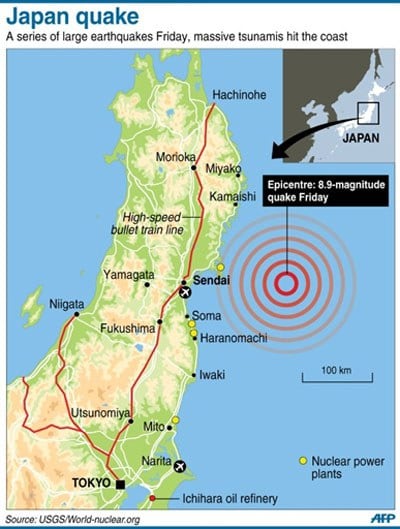China on Friday offered assistance and condolences to Japan following a devastating 8.9-magnitude earthquake in the northeast of the country, in spite of recently strained ties between the two Asian powers.
But media coverage was limited as state-owned broadcasters have forbidden Chinese news websites to stream live coverage from sites of the massive quake and tsunami disaster, in which, according to Kyodo news agency, more than 1,000 people probably died.
Under China's reporting guidelines for emergency situations, coverage is limited to a small number of state-controlled media.
China is coping with the aftermath of its own earthquake, a 5.8-magnitude quake that struck its southwestern Yunnan province on Thursday, killing at least 25 people, injuring 250, and destroying some 18,000 houses.
Premier Wen Jiabao conveyed "deep sympathy and solicitude to the Japanese government and people" to his Japanese counterpart Naoto Kan.
300 bodies

Japan's National Police Agency said that 137 people had been confirmed dead and 531 were missing, with 627 others injured after the quake, the biggest on record to hit Japan, rocked the northeast coast.
A spokesman said this did not include up to 300 bodies reportedly found on the coast of the northeastern city of Sendai.
The earthquake also sparked the closure of four nuclear power plants, along with the closure of high-speed rail links and the Narita International Airport.
U.S. President Barack Obama said Japan's Prime Minister Naoto Kan told him during a phone call that so far there were no signs of any radiation leak. Obama ordered two U.S. aircraft carriers to Japan to provide assistance, describing the disaster as "simply heartbreaking."
Chinese official media said that China's International Rescue Team had prepared team members, equipment, materials, and medicine, and were ready to depart for Japan at any time.
State-run broadcasters covered the disaster in evening news shows, but netizens turned to online video and microblogging services for real-time information.
Loved ones
According to leading microblogging service Sina Weibo, its users posted 4.5 million updates to the Twitter-like service within four hours of the quake, many in an attempt to find loved ones in the absence of phone service.
"[We are] watching the Japan earthquake, and admiring the spirit that those people have in the face of such a disaster," wrote user xuxiegudan. "[They are] not like Chinese people. We didn't really do much at all."
"Looking at the Japan earthquake, I don't know whether to be happy or sad," commented user fanyulin.
"There are two different moods on Sina Weibo about the Japan earthquake ... One is of concern; the other is of celebration, where people are cursing them and saying they deserved it," added user zhangyuliang.
Chinese residents of the quake-hit region said most public transport links were down, and that normal telephone connections had recently been restored.
"The buildings swayed about a lot here, and for a very long time," said a Chinese resident of Tokyo surnamed Feng.
"As soon as I got online to take a look I was scared stiff; I really didn't think it would be so devastating," she said.
"The trams have all stopped here. Only the buses are moving."
"The cell phone networks are down ... and there are long queues outside all the public pay phones in the streets," she added.
Beijing felt tremors
Tremors from the earthquake were reported as far away as Beijing, residents said.
"I definitely felt it," said a Hong Kong resident of Beijing's western district of Haidian surnamed Yan. "I was asleep in bed and I felt this shaking and rocking sensation."
"It lasted about 10 minutes."
An RFA Cantonese service correspondent in Tokyo said he was in a subway train at the time of the earthquake, and the authorities evacuated passengers to the surface.
An official who answered the phone at the State Seismological Bureau said he had received a number of similar reports.
"They were mostly from people in tall buildings," the official said. "The oceanic bureau said it doesn't expect much impact from tsunamis in China."
Schoolchildren and office-workers were sent home from cities along Taiwan's eastern seaboard on Friday following the tsunami warnings generated by the earthquake.
But local residents said there was unlikely to be any major impact from waves.
"The land along the east coast of Taiwan is very steeply sloping," said a local tsunami watcher surnamed Zhang.
"If the waves are [as reported] then there won't be much impact here," he said.
Confusion
The earthquake had sparked confusion about the number of Chinese nationals currently in the quake-hit area, tour operators said.
"All China's leaders are holding a meeting right now to discuss developments," said an employee who answered the phone at the state-owned China Travel Service (CTS).
"So far we haven't had any fresh news," she said.
An employee at CTS' Guangzhou branch surnamed Leung said the three Chinese tour groups currently in Tokyo had confirmed that everyone was unharmed.
A foreign ministry official said the ministry would issue information about the quake in due course.
Reported by Lee Kin Kun, Bi Zimo, and Wen Yuqing for RFA's Cantonese service, and by Zhang An An and Ding Xiao for the Mandarin service. Written in English by Luisetta Mudie.
